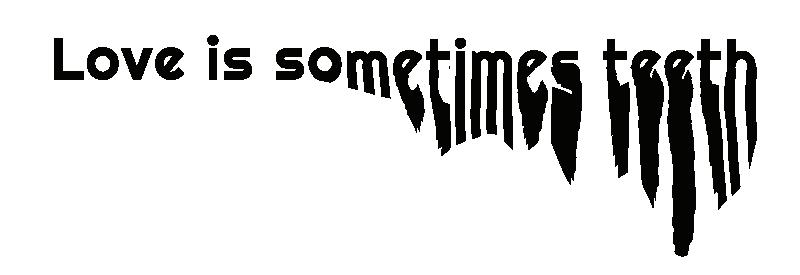
4 minute read
Love is sometimes teeth | DESCENT Issue #4
RUI ZHANG
Advertisement
water / waterhungry / water / water / water
water / water / dapplelight/ water
dapplelight / water / waterhungry
hungry, hungry, hungry / for?
hungry / hungry / hungry
silt / silt / water, and me /
me, me, me, this / one /is meant
For me, bite, bite, bite harder, bite harder. Come/go in.
/ good /
To speak about kneeling, to kneel to a god is a useless ritual. You’d be better off kneeling to fix the zipper on your girlfriend’s skirt, to tie her shoelace. She’ll look at the lopsided part of your hair and it’ll actually mean something to her. What else, then? You want to kiss the god’s hands? You can kiss a god’s hands, but what do gods know of tenderness? What they know is that your mouth is descending on that glittering palm to sink your teeth in. All they know is teeth. To live like a god is to be nothing but teeth, devouring outwards, devouring inwards. They’re cruel. Say then, that a god learns to love you. Sheds the tiger fur, learns to nose their way up the curve of your neck. Say they learn new kinds of reverence, say they learn to peel oranges and give you half. I still die. I run down to the After and they’re left behind with a body once learned and themselves. They can throw the body away, but then they’re still left with their hands. What is cruelty, sometimes, if not self preservation?
Then to speak about tragedy, nobody knows it better than a dandelion. Say you eat and eat and eat and drink and grow your head huge with thin white wisp, a miniscule marvelous proof of nature’s engineering degree. You are born to waste away– you are made to be deci mated by the breeze, because decimation, for you, means propagation. There goes the next generation, borne away by unknown forces, born from your devastation. Maybe this is what you wanted, but that makes you no less naked. The sum of your life blown away, and you’re still left there among the grass. No dandelion is free from necessary tragedy–simple and benign as you are, it only takes the next wispy haired toddler with a greedy hand to rip you from the dirt and scatter you. It’s not a far fall from godship to weeds. I’m still learning the same lessons.
So step far away. Try being the house next. This is a wondrous thing. What does a house hope to accomplish? Anything it wants, it is— the meaning of its being comes built in. Does it hope to offer shelter? A house isn’t a house if it doesn’t offer shelter. When you call a house a house, you make it one. Does a house fear? Well, yes, it fears the possibility of not being a house. We all waste away eventually, but it is a pain to outlive one’s usefulness. Until then I linger— I linger and I want for nothing. That’s what I want, to want for nothing, because to be want ed is to be here, and to be here is to be lost eventually. Better to be a thing left behind than a thing lost.
That, at least, is the hypothesis. Unfortunately I’m not much of a scientist. I’ve been trying to leave you behind, dear, because the lives in which we never find each other grant us the cruel mercy of never losing each other. But I forgot that tenderness is a plague that always outsmarts us, and that we never grow immune to it. Thus my experiment yields these results to its foolish conductor– that a god learns to crouch and kiss the skin behind the ears, savors the taste of sorrow that comes prepackaged with loving things that die. That toddlers love beautiful things, that decimation is an earnest attempt to make more beautiful things. That even the house has fires that burn it back down to where it came from, a merciful act of devastation, salvation from a hundred years of slow rot. That you will always come as the god, as a toddler, as the house fire, that when I’m the orange you are the splitting of it, the euthanasia for my sick dog, the crashing and clattering of my broken plates. That even when I’m a moray eel, an ugly foul unlovable thing that’s all teeth and knows nothing but hunger, you offer me an easy tar get, you offer me flesh for my flesh. I conclude that I’m not very good at leaving you behind, dear, so I’m coming back now. Sorry about all that.










